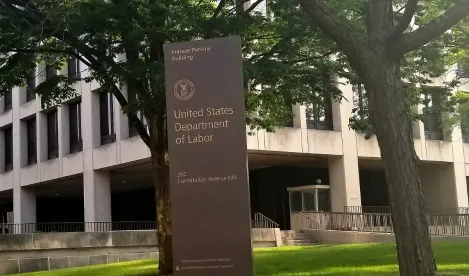In 2017, then-Department of Labor (DOL) Secretary Alexander Acosta, appointed by former President Donald Trump, announced the Wage and Hour Division (WHD) would be reviving the practice of issuing Opinion Letters, seeking to “provide clarity that helps increase compliance to the benefit of all.”
Opinion Letters represent official statements of DOL policy and, therefore, may form the basis of a “good faith” defense to an alleged Fair Labor Standards Act (FLSA) violation. During the Obama administration, the DOL stopped issuing such letters. Instead, it opted for more limited “Administrator Interpretations” that covered broader issues as opposed to the often nitty-gritty details addressed in Opinion Letters.
The first Opinion Letters issued during the Trump administration were in April 2018 and, over the ensuing years, the WHD issued more than 70 Opinion Letters, culminating with the release of nine letters during the last days of the administration in early 2021.
Whether the DOL under the Biden administration will continue the practice of issuing Opinion Letters, return to the use of Administrator Interpretations, or adopt some other approach altogether remains to be seen.
In the meantime, the following summaries discuss the nine most recent Opinion Letters which, like any opinion, are subject to review and rescission by a new administration.
FLSA2021-1
In Opinion Letter FLSA2021-1, the DOL concludes that account managers for a life science company qualify for the FLSA’s administrative exemption.
The DOL explains that these account managers were comparable to the pharmaceutical sales representatives found to be exempt in recent cases from the Third and Seventh Circuit Courts of Appeal, in that their primary duties were not of “production” in nature, but instead fell under the “general business operations of the employer.”
In addition, the DOL concludes that these account managers met the “discretion and independent judgment” element of the exemption, because they evaluated client needs and interests and determined the best way to satisfy those needs and interests.
Finally, the “matters of significance” factor was met because of the client relations aspects of the account managers’ duties and how the performance of their job could have significant financial impact on the company if the managers did not obtain, maintain, or retain those client relationships successfully.
Moreover, the managers were given “wide latitude” in how they promote and market the company’s products to clients, rather than having to follow a specific script or sales process, thereby distinguishing them from other types of account managers who do not have such authority.
FLSA2021-2
In FLSA2021-2, a private religious daycare and preschool asked whether its instructors qualify for the ministerial exception to the FLSA, such that it did not have to satisfy the requirements of the FLSA. The school asserted that its instructors should be categorized as ministers and, therefore, fall under the exception, because to some degree they all provide religious teaching to the students.
The DOL first notes that there is “no checklist” to determine whether an employee (other than a minister) qualifies for the ministerial exception. “Instead, a variety of factors may be important, based on their relationship to an employee’s role in conveying the Church’s message and carrying out its mission.” In other words, the analysis is conducted on a “case-by-case basis and requires considering all relevant circumstances” to determine whether the position “implicates the fundamental purpose of the exception.”
The DOL then quickly concludes that the instructors at issue were properly determined to be subject to the ministerial exception and, therefore, could be paid in a manner that otherwise would not comport with the requirements of the FLSA.
FLSA2021-3
In FLSA2021-3, the DOL addresses whether various business entities qualify for the seasonal “amusement or recreational establishment” exemption to the FLSA, as set forth in 29 U.S.C. § 213(a).
After noting that, unlike most other others, the amusement or recreational establishment exemption focuses on the characteristics of the business and not on the duties or responsibilities of a particular employee, the DOL addresses each business in turn. The first business, which arranges for educational nature hikes and overnight campouts for children, did not satisfy the exemption because it was not an “establishment,” as it neither operated nor controlled a “distinct physical place of business,” as required under the exemption. Rather, all of the activities were sold and scheduled through the internet and, even though the business maintained an office, none of the programmed activities use it in any way. Moreover, while a business may qualify as an establishment by temporarily assuming control of a physical location (such as a carnival that leases an empty lot during its operation), in this case, the business undertook no such control of the locations where its program activities occurred.
The second entity’s questions focused on the “seasonal” element of the amusement or recreational establishment exemption. To qualify for the exemption, a business must satisfy either the “Calendar Test” or the “Receipts Test” to demonstrate that it truly is seasonal in nature. A business satisfies the Receipts Test if, during the preceding calendar year, its average receipts for any six months were not more than a third of its average receipts for the remaining six months. The business in question asked if charitable gifts and donations constitute “receipts” under this test. The DOL concludes that they do not, noting that the history of the exemption demonstrates that receipts refer to income received in exchange for goods or services, a definition that would not include charitable donations.
Finally, the DOL concludes that, like the first business at issue, the third entity — a “mobile carnival” — was not an “establishment” because its warehouse, offices, and other physical locations were used only for support and not for any of the amusement services it provided. On the contrary, the third business merely assisted other businesses, non-profits, and universities to “co-produce” short-term amusement services, typically lasting no more than a day, the DOL points out.
FLSA2021-4
Opinion Letter FLSA2021-4 addresses questions raised by a restaurant regarding how to properly apply tip pooling to its servers who share tips with hosts and hostesses.
Citing its recently published, but not yet effective, Final Rule, the DOL reiterates that if an employer does not take a tip credit (i.e., it must pay all of the employees in the pool at least standard minimum wage), it may include both traditionally tipped and traditionally non-tipped workers in a tip pool. In addition, of course, as set forth by Congress in 2018, employers (including managers and supervisors, as defined by the Final Rule) may never participate in a tip pool, it notes. Hosts also may participate in a tip pool, even if no tip credit is taken, so long as they are a group that customarily and regularly receive tips.
Significantly, in light of a memorandum issued by President Biden’s assistant on the President’s first day in office, it remains to be seen whether this Final Rule ever becomes effective, especially as it pertains to what constitutes tip-related duties (i.e., the “80/20” rule formally abrogated by the Final Rule).
FLSA2021-5
FLSA2021-5 seeks to assist an employer in determining how to properly calculate a restaurant employee’s overtime pay when that employee works as both a bartender and a server and receives automatic gratuities and service charges.
The employee worked 42 total hours during the week in question. He was paid $2.13 per hour (the tip credit rate) for the 18 hours worked as a server and $75 per shift for three shifts he worked as a bartender. He also received $732 in tips and $160 in service charges.
The DOL explains that when an employee works in two different jobs during a single workweek, with different non-overtime rates of pay, the “regular rate” for overtime purposes is the weighted average of those rates. In this case, the straight time wages are $130.50 for the hours worked as a server [18 hours x ($2.13 tip wage + $5.12 tip credit)] and $225 as a bartender (3 shifts x $75 per shift), plus $160 in service charges, for a total of $515.50. Dividing the total by the 42 hours worked equals a regular hourly rate of $12.27, and the premium due for the two hours of overtime is $12.27 ($12.27 x 0.5 half-time premium x 2 hours).
FLSA2021-6
In FLSA2021-6, the DOL concludes that the “retail commissioned salesperson” exception, set forth in 29 U.S.C. § 207(i), applies to the staffing firm in question.
Critically, in May 2020, the DOL withdrew its long-standing regulation (29 C.F.R. § 779.317) setting forth the types of businesses that were (or were not) “retail or service establishments” and, thus, could or could not qualify for the exemption. In those abandoned regulations, employment agencies were listed among the non-retail establishments that typically would not qualify for the exemption.
Under the DOL’s current approach, whether a business has a “retail concept” is evaluated on a case-by-case basis without regard to the prior lists of retail and non-retail establishments, which courts had criticized as nonsensical. This Opinion Letter is the second in which the DOL identified as retail under Section 207(i) a type of establishment that previously was categorized as non-retail.
FLSA2021-7
In Opinion Letter FLSA2021-7, the DOL concludes that the “creative professional” exemption may apply to local and small-town community news journalists and reporters.
In the past, such journalists typically were deemed not to qualify because they “only collect, organize, and record information that is routine or already public,” without “contribut[ing] a unique interpretation or analysis to a news product.”
Recognizing that, with the technological advances in modern times, even small-town and community journalists are no longer merely reporting “just the facts,” but may be engaging in analytical, “context-based” reporting, the DOL finds that they very well may qualify for the creative professional exemption.
FLSA2021-8
In FLSA2021-8, the DOL concludes that the food distributors in question are independent contractors and not employees of the manufacturers whose food products they are distributing.
Citing to the soon-to-be-effective (if not delayed) new Final Rule, the DOL first evaluated the business relationship in light of the two “most probative” “core” factors to be considered in the employee vs. independent contractor analysis: (1) “the nature and degree of control over the work” and (2) “the worker’s opportunity for profit or loss based on initiative or investment.” If those two factors do not clearly point toward either an employment relationship or an independent contractor relationship, then three other factors are considered: (3) “the amount of skill required for the work”; (4) “the degree of permanence of the workers’ relationship with the potential employer”; and (5) “whether the work is part of an integrated unit of production.” In all cases, “the actual practice of the parties involved is more relevant than what may be contractually or theoretically or possible.”
As with the DOL’s recent Final Rule regarding tip pooling, it remains to be seen whether the Biden administration or the Democrat-controlled Congress will undertake efforts to abrogate the new Independent Contractor Final Rule.
FLSA2021-9
In the last Opinion Letter issued by the outgoing administration, the DOL states in FLSA2021-9 that the legal obligations of motor carriers to implement health and safety measures (such as installation of onboard video monitors, engine data sensors, and speed limiters, and required attendance at monthly safety meetings or completion of safe-driving courses) do not support a determination that the motor carrier “controls” the owner-operators for purposes of establishing the first “core factor” in the DOL’s recently implemented Independent Contractor Final Rule. The DOL then concludes, under the specific facts presented, that the owner-operators in question are independent contractors and not employees of the motor carrier company.





 />i
/>i

